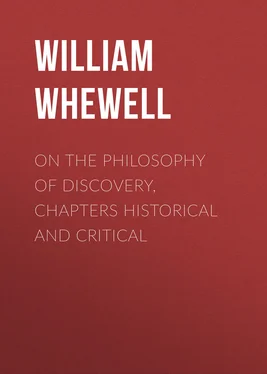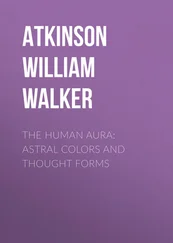William Whewell - On the Philosophy of Discovery, Chapters Historical and Critical
Здесь есть возможность читать онлайн «William Whewell - On the Philosophy of Discovery, Chapters Historical and Critical» — ознакомительный отрывок электронной книги совершенно бесплатно, а после прочтения отрывка купить полную версию. В некоторых случаях можно слушать аудио, скачать через торрент в формате fb2 и присутствует краткое содержание. Жанр: foreign_prose, foreign_religion, Философия, foreign_psychology, foreign_antique, на английском языке. Описание произведения, (предисловие) а так же отзывы посетителей доступны на портале библиотеки ЛибКат.
- Название:On the Philosophy of Discovery, Chapters Historical and Critical
- Автор:
- Жанр:
- Год:неизвестен
- ISBN:нет данных
- Рейтинг книги:5 / 5. Голосов: 1
-
Избранное:Добавить в избранное
- Отзывы:
-
Ваша оценка:
- 100
- 1
- 2
- 3
- 4
- 5
On the Philosophy of Discovery, Chapters Historical and Critical: краткое содержание, описание и аннотация
Предлагаем к чтению аннотацию, описание, краткое содержание или предисловие (зависит от того, что написал сам автор книги «On the Philosophy of Discovery, Chapters Historical and Critical»). Если вы не нашли необходимую информацию о книге — напишите в комментариях, мы постараемся отыскать её.
On the Philosophy of Discovery, Chapters Historical and Critical — читать онлайн ознакомительный отрывок
Ниже представлен текст книги, разбитый по страницам. Система сохранения места последней прочитанной страницы, позволяет с удобством читать онлайн бесплатно книгу «On the Philosophy of Discovery, Chapters Historical and Critical», без необходимости каждый раз заново искать на чём Вы остановились. Поставьте закладку, и сможете в любой момент перейти на страницу, на которой закончили чтение.
Интервал:
Закладка:
2. ( Thomas Campanella ).—Accordingly, Telesius may be looked upon as the founder of a School. His most distinguished successor was Thomas Campanella, who was born in 1568, at Stilo, in Calabria. He showed great talents at an early age, prosecuting his studies at Cosenza, the birth-place of the great opponent of Aristotle and reformer of philosophy. He, too, has given us an account 113 113 Thom. Campanella de Libris propriis , as quoted in Tenneman, ix. 291.
of the course of thought by which he was led to become an innovator. "Being afraid that not genuine truth, but falsehood in the place of truth, was the tenant of the Peripatetic School, I examined all the Greek, Latin, and Arabic commentators of Aristotle, and hesitated more and more, as I sought to learn whether what they have said were also to be read in the world itself, which I had been taught by learned men was the living book of God. And as my doctors could not satisfy my scruples, I resolved to read all the books of Plato, Pliny, Galen, the Stoics, and the Democriteans, and especially those of Telesius; and to compare them with that first and original writing, the world ; that thus from the primary autograph, I might learn if the copies contained anything false." Campanella probably refers here to an expression of Plato, who says, "the world is God's epistle to mankind." And this image, of the natural world as an original manuscript, while human systems of philosophy are but copies, and may be false ones, became a favourite thought of the reformers, and appears repeatedly in their writings from this time. "When I held my public disputation at Cosenza," Campanella proceeds, "and still more, when I conversed privately with the brethren of the monastery, I found little satisfaction in their answers; but Telesius delighted me, on account of his freedom in philosophizing, and because he rested upon the nature of things, and not upon the assertions of men."
With these views and feelings, it is not wonderful that Campanella, at the early age of twenty-two (1590,) published a work remarkable for the bold promise of its title: " Thomas Campanella's Philosophy demonstrated to the senses, against those who have philosophized in an arbitrary and dogmatical manner, not taking nature for their guide; in which the errors of Aristotle and his followers are refuted from their own assertions and the laws of nature: and all the imaginations feigned in the place of nature by the Peripatetics are altogether rejected; with a true defence of Bernardin Telesius of Cosenza, the greatest of philosophers; confirmed by the opinions of the ancients, here elucidated and defended, especially those of the Platonists ."
This work was written in answer to a book published against Telesius by a Neapolitan professor named Marta; and it was the boast of the young author that he had only employed eleven months in the composition of his defence, while his adversary had been engaged eleven years in preparing his attack. Campanella found a favourable reception in the house of the Marchese Lavelli, and there employed himself in the composition of an additional work, entitled On the Sense of Things and Magic , and in other literary labours. These, however, are full of the indications of an enthusiastic temper, inclined to mystical devotion, and of opinions bearing the cast of pantheism. For instance, the title of the book last quoted sets forth as demonstrated in the course of the work, that "the world is the living and intelligent statue of God; and that all its parts, and particles of parts, are endowed some with a clearer, some with a more obscure sense, such as suffices for the preservation of each and of the whole." Besides these opinions, which could not fail to make him obnoxious to the religious authorities, Campanella 114 114 Economisti Italiani , t. i. p. xxxiii.
engaged in schemes of political revolution, which involved him in danger and calamity. He took part in a conspiracy, of which the object was to cast off the tyranny of Spain, and to make Calabria a republic. This design was discovered; and Campanella, along with others, was thrown into prison and subjected to torture. He was kept in confinement twenty-seven years; and at last obtained his liberation by the interposition of Pope Urban VIII. He was, however, still in danger from the Neapolitan Inquisition; and escaped in disguise to Paris, where he received a pension from the king, and lived in intercourse with the most eminent men of letters. He died there in 1639.
Campanella was a contemporary of Francis Bacon, whom we must consider as belonging to an epoch to which the Calabrian school of innovators was only a prelude. I shall not therefore further follow the connexion of writers of this order. Tobias Adami, a Saxon writer, an admirer of Campanella's works, employed himself, about 1620, in adapting them to the German public, and in recommending them strongly to German philosophers. Descartes, and even Bacon, may be considered as successors of Campanella; for they too were theoretical reformers; but they enjoyed the advantage of the light which had, in the mean time, been thrown upon the philosophy of science, by the great practical advances of Kepler, Galileo, and others. To these practical reformers we must soon turn our attention: but we may first notice one or two additional circumstances belonging to our present subject.
Campanella remarks that both the Peripatetics and the Platonists conducted the learner to knowledge by a long and circuitous path, which he wished to shorten by setting out from the sense. Without speaking of the methods which he proposed, we may notice one maxim 115 115 Tenneman, ix. 305.
of considerable value which he propounds, and to which we have already been led. "We begin to reason from sensible objects, and definition is the end and epilogue of science. It is not the beginning of our knowing, but only of our teaching."
3. ( Andrew Cæsalpinus. )—The same maxim had already been announced by Cæsalpinus, a contemporary of Telesius; (he was born at Arezzo in 1520, and died at Rome in 1603). Cæsalpinus is a great name in science, though professedly an Aristotelian. It has been seen in the History of Science 116 116 Hist. Ind. Sc. b. xvi. c. iii. sect. 2.
, that he formed the first great epoch of the science of botany by his systematic arrangement of plants, and that in this task he had no successor for nearly a century. He also approached near to the great discovery of the circulation of the blood 117 117 Ibid. b. xvii. c. ii. sect. 1.
. He takes a view of science which includes the remark that we have just quoted from Campanella: "We reach perfect knowledge by three steps: Induction, Division, Definition. By Induction, we collect likeness and agreement from observation; by Division, we collect unlikeness and disagreement; by Definition, we learn the proper substance of each object. Induction makes universals from particulars, and offers to the mind all intelligible matter; Division discovers the difference of universals, and leads to species; Definition resolves species into their principles and elements 118 118 Quæst. Peripat. i. 1.
." Without asserting this to be rigorously correct, it is incomparably more true and philosophical than the opposite view, which represents definition as the beginning of our knowledge; and the establishment of such a doctrine is a material step in inductive philosophy 119 119 Tenneman, ix. 108.
.
4. ( Giordano Bruno. )—Among the Italian innovators of this time we must notice the unfortunate Giordano Bruno, who was born at Nola about 1550 and burnt at Rome in 1600. He is, however, a reformer of a different school from Campanella; for he derives his philosophy from Ideas and not from Observation. He represents himself as the author of a new doctrine, which he terms the Nolan Philosophy . He was a zealous promulgator and defender of the Copernican system of the universe, as we have noticed in the History of Science 120 120 Hist. Ind. Sc. b. v. c. iii. sect. 2.
. Campanella also wrote in defence of that system.
Интервал:
Закладка:
Похожие книги на «On the Philosophy of Discovery, Chapters Historical and Critical»
Представляем Вашему вниманию похожие книги на «On the Philosophy of Discovery, Chapters Historical and Critical» списком для выбора. Мы отобрали схожую по названию и смыслу литературу в надежде предоставить читателям больше вариантов отыскать новые, интересные, ещё непрочитанные произведения.
Обсуждение, отзывы о книге «On the Philosophy of Discovery, Chapters Historical and Critical» и просто собственные мнения читателей. Оставьте ваши комментарии, напишите, что Вы думаете о произведении, его смысле или главных героях. Укажите что конкретно понравилось, а что нет, и почему Вы так считаете.












